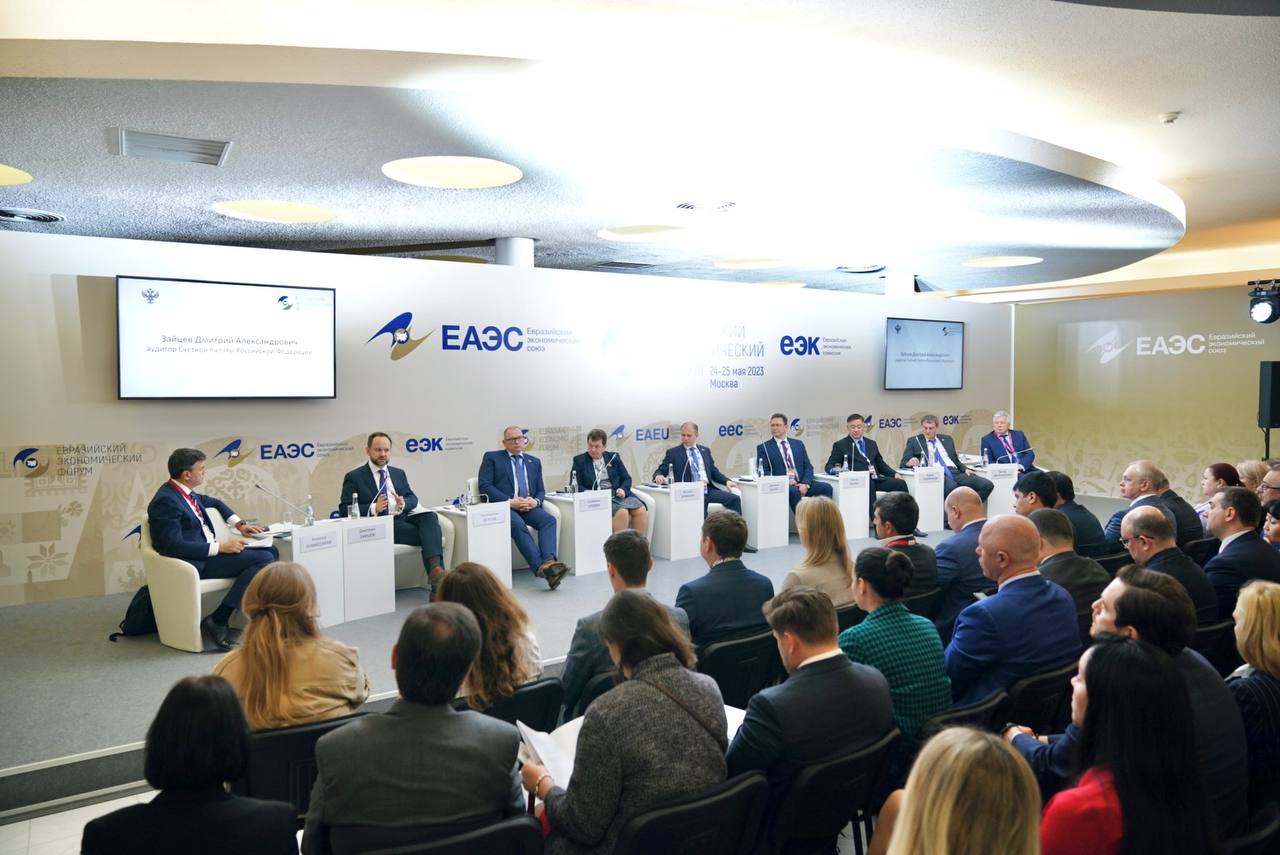
SAI Russia Discusses Innovation in Public Administration at the Eurasian Economic Forum
Public administration, an environment for high-tech markets, and technological sovereignty are key factors of innovative development and economic growth.
Participants of the Innovative Development and Growth in EAEU Economies: The Efficient Activities of State Institutions session held on the sidelines of the Eurasian Economic Forum discussed problem-solving strategies in modern realities.
The Accounts Chamber of the Russian Federation, the session organizer, was represented by Members of the Board, Mr. Dmitry Zaitsev and Ms. Svetlana Orlova. The discussion was attended by the representatives of the State Duma, the Federation Council, the Chamber of Control and Accounts of Moscow, and SAIs of four countries – Belarus, Kazakhstan, Kyrgyzstan, and Uzbekistan. SAI Cuba also took part in the session by sending the video address to the participants of the Forum. The session’s moderator Alexei Komissarov, RANEPA Acting Rector, generated a meaningful dialogue during the session.
The experts discussed the scientific and technological potential of the Eurasian Economic Union (EAEU) member states, best practices for introducing advanced applied solutions, and opportunities for the use of joint resources. Participants highlighted that today's realities dictate a focus on technological sovereignty, namely, the development and implementation of domestic innovative technologies across industries, with scaling up these developments' competitiveness in the global market, since technological innovation is amongst most prospective GDP drivers. According to the Russian Academy of Sciences, scientific and technological progress contributes to as much as over 90% of economic growth in technologically advanced countries, with an estimation of only 75–85% of GDP growth still accounting for this sector in EAEU.
Increasing this contribution is partly a matter of regulation,
said Dmitry Zaitsev.
However, this is also a matter of courage and ability to risk with an eye on our countries’ traditions, because the government is as rightful participant in the innovation business as the entrepreneur. Only the government can come up with breakthrough inventions promoting innovation and technology in other markets. Why does the government engage in this type of business? Because of a high risk and because an entrepreneur would not engage in fundamental research with a return on investment to be expected in 100 to 150 years.
The reporter also touched upon the difficulties associated with innovation audit, in particular, data availability and quality. The data is either outdated, i.e., no longer related to innovation at the time of the audit or simply not visible or non-transparent. That is why it is impossible to analyze businesses or government efforts in this area.
Nowadays, in the context of sanctions, significant amount of data on the statistics and tax accounting systems is restricted, which, of course, complicated its collection. In innovation data openness should be prioritized,
said Dmitry Zaitsev.
In her speech, Member of the Board, Ms. Svetlana Orlova focused on boosting comprehensive cooperation within EAEU.
The world is changing rapidly. Every opportunity should be used to ensure joint mutual development and protection of sovereign interests of EAEU member states,
she emphasized.
The sanctions open new opportunities. Public administration has withstood both the pandemic and the sanctions, as we saw the turnover with the EAEU countries grow by almost 14% last year. Over 7 million tons of goods have passed clearance procedures during the support period manifested in zero customs duties and tariff benefits. The new realities call for logistics restructuring. If an unfriendly country introduces illegal unilateral sanctions, the International North–South Transport Corridor that passes through Iran is an alternative to the Southern Sea Route, with delivery taking only ten days instead of thirty.
Svetlana Orlova stressed the role of financial audit institutions in accelerating economic growth and increasing national innovative potential.
The Accounts Chamber carries out audits and reveals risks,” said Svetlana Orlova. “For example, we have increased the effectiveness of state programs audit. Each of them has people and businesses behind them. And we have shown that state programs comprise multiple technical indicators, while only 35% of federal programs are implemented with a high degree of efficiency and responsibility.
According to Svetlana Orlova, the Accounts Chamber places particular focus on key public administration issues, such as social support, digitalization, improvement of control, and supervision as well as anti-corruption measures. The audits carried out by the Accounts Chamber last year have revealed 4,447 violations and deficiencies amounting to around RUB 886 billion. In fact, in 2022, the Accounts Chamber has returned about RUB 8.9 billion to the federal budget.
Audit institutions play a crucial role in arranging and managing investment. Our audit materials can be used for increasing knowledge and thorough study of the effectiveness of finance. A key point is that our professionalism is what determines the welfare of our citizens,
said Svetlana Orlova.



